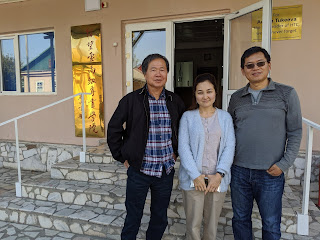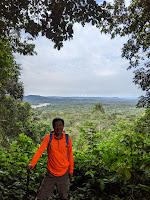And kids are not about being shy or bashful, but bright and sprightly here. Say hi to a roomful of kindergarten kids and they all turn and vigorously greet you back. At one of the schools we visited, a 1st-grader-ish boy came up to us introducing himself as a boxer (the school did offer boxing lessons), and asked if we knew of Mike Tyson?... Bruce Lee?... Muhammad Ali?... Jean-Claude Van Damme...

The young, smart, fluent English speaking female principal of the vocational college we visited was actually a graduate from the first Christian school the foundation set up some 18 years ago, who came back to work at the college a couple years ago when it started and grew her way up to the principal position. Talking about sowing and harvesting, fruits of education.

One expressed intent of my trip here was to meet and talk with the university's IT department staff and students, to get a feel and explore the possibility of bringing online development project opportunities to the motivated and talented.
My encounter with the IT students started off at a casual off-campus lunch with four of them (who all later became my group discussion members at the TWTS leadership training course): Abai, the typical, smart, computer wizard kid, Azamat, the pensive one, Iskak, the young and restless, and Aisulu, a bubbly girl who looked every inch like my niece-in-law in Taiwan. All seemed curiously excited about the possibilities I mentioned.
I then met with the IT department staff at school: Polina, the charming department head, Andrei, head of IT services for both the university and the vocational college, and Kochkorov, head of career development. All welcomed the ideas I proposed, as educational and potentially monetarily rewarding opportunities for the students. As a matter of fact, Andrei, who also taught web programming at the schools and had done some online projects himself, had thought about assembling a "programming club"--as many commercial IT companies in Bishkek have been doing for their junior programmers to practice development skills--to take on online projects for some of his students too.

So he informed and gathered a group of around 15 students he pre-selected to meet with me at school, where I introduced myself and my ideas and invited them to share their online development experiences--if any--with me and others. Out of a few who spoke, one 14-year-old said he had done some online project since age 12! Wow, I knew that's what I would find here (like anywhere else in the world)!

International Micro-Enterprise Development (IMED) is a micro-financing program that gives start-up loans to worthy small businesses that the foundation has started doing about a year ago. I got to see and meet those businesses and people who had received loans last year as the Special Project Manager from the foundation took me along for the program's follow-up visits.
Out of those we met--the tin metal maker, the wedding photographer, the carpenter, the plumber, the car repairman, and the beef jerky maker--three struck me with their unusual backgrounds and life stories:
S. was a Uzbek living in southwestern Kyrgyzstan, the most conservative and Islamic part of the country. When he and his brother's conversion to Christianity was known by their neighbors, an angry mob took them to a public ground and demanded that they recant and revert to their Islamic faith. When they refused the Imam turned his back and signaled the mob to stone them to death, but the police cars arrived in time to take them to safety. They and their families had since left their hometown and moved north here to start a new life where S. runs his carpentry business while pastoring and hosting weekly Bible studies for his relatives and other fellow Uzbek Christians here.
V. had an abusive Korean father (whose father was one of those displaced by Stalin from Russian Far East to Kazakhstan in the late 1930's) and an Armenian mother. At age 17 he was in such depression he almost killed his father or himself if not for his new found Christian faith. He graduated from the foundation's university and is now managing John (the Canadian)'s farm, studying for Master's degree on international project management, and starting a beef jerky manufacturing business with his friend/partner A.
A. is a German Kyrgyz of Mennonite descent who nowadays goes to Calvary Church in Bishkek. He had gone to study and got a business degree in Lithuania but decided to come back to fight for orphans' welfare in his home country. He works for World Without Orphans on legal matters while running the sales and marketing side of the beef jerky business he started with V. He is happily married with a lovely wife and 5 daughters, 4 of them orphans they adopted.













































